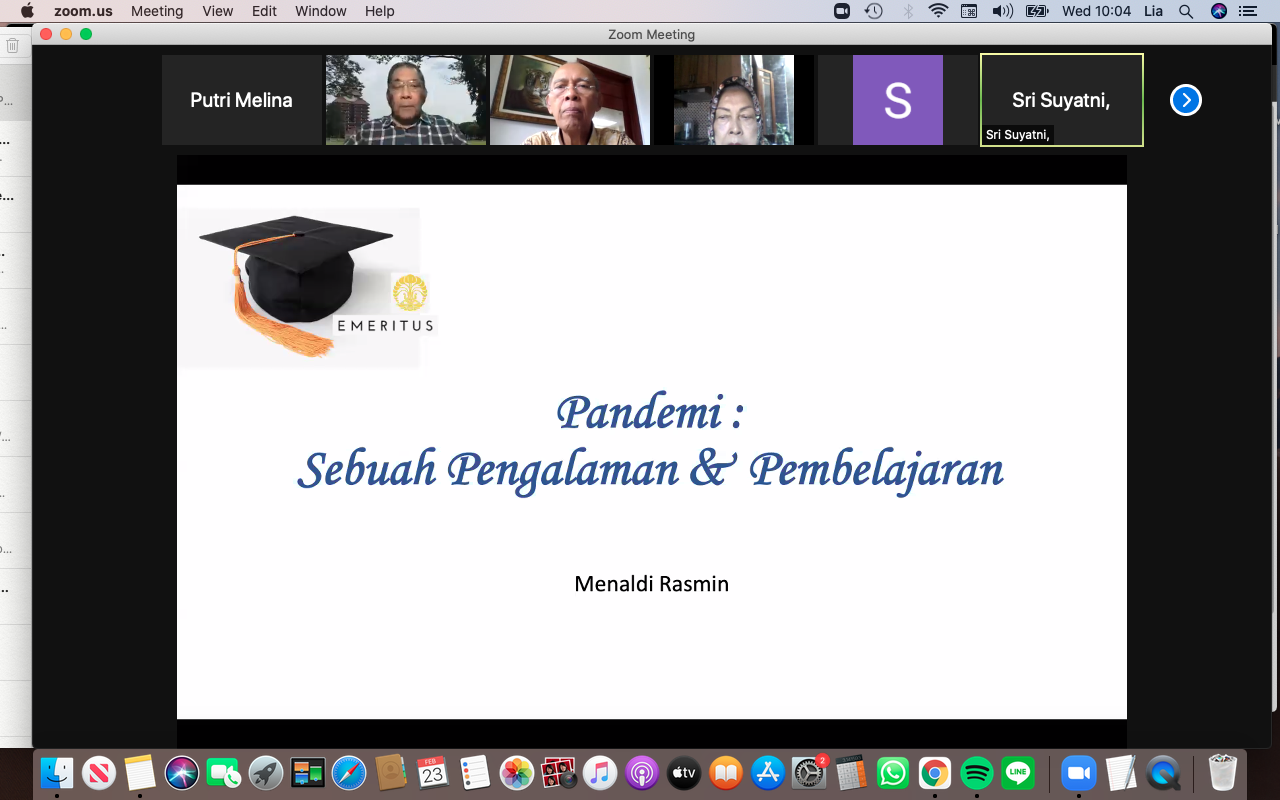On Wednesday (23/2), the FTUI Emeritus Institute again held a Sharing Session with the theme “The Great Enlightenment of Our Lungs Against Omicron”. Pulmonology and Respiratory Medicine Specialist, Prof. dr. Menaldi Rasmin, SpP(K) from the Department of Pulmonology and Respiratory Medicine, Faculty of Medicine, Universitas Indonesia (FKUI) was present as a speaker.
The event was also attended by the Chair of the FTUI Emeritus Institute, Prof. Djoko Hartanto. Also present were professors and lecturers in FTUI and UI, including: Prof. Bagio Budiarjo, Dr. Azrar Hadi, Dr. Ellen Tangkudung, Ir. A. Endang Sriningsih, Dr. Dewi Matindas, Dr. Djamhari Sirat, as well as the former Ambassador of the Republic of Indonesia to Ecuador, Dra. Diennaryati Tjokrosuprihatono M.Psi.
Prof. Menaldi explained the material entitled “Pandemic: An Experience and Learning”. In his opening, Prof. Menaldi alludes to the health-ill triangle. “This triangle is a mutually sustainable relationship between humans as hosts, disease-causing agents called agents, and the environment. If these three important points are not balanced, in the sense that only two of the three things go well, it will result in illness. This is what happened during the Covid-19 pandemic. Humans have to deal with agents in the form of Covid-19 and face communities infected with the virus.”
Since the end of last January until now, Indonesia is struggling to face the third wave of pandemics with the Omicron variant dominating. In his presentation, Prof. Menaldi explained how the virus entered the body through the upper respiratory tract. The human body automatically tries to fight the incoming virus. However, in this process, healthy cells are also affected.
“If the human body’s defenses fail to fight the virus, this will cause reactions such as respiratory problems. The body’s pathway which functions is to carry oxygen is controlled by the virus. Eventually, the body tries to pressure itself to get oxygen from other places like the brain. This is what causes shortness of breath and causes Covid-19 patients to experience high blood pressure,” said Prof. Menaldi.
Not only that, after recovering from Covid-19, survivors also need to be aware of three side events, reduced lung elasticity or what is known as pulmonary hyperinflation, coinfection, and blood coagulation. The big impact of Covid-19 can be prevented from the chain of transmission, obeying health protocols, living a healthy lifestyle, and vaccinating.
Prof. Menaldi also stated his response to the policies taken by various countries regarding the relaxation of protocols when the third wave of the pandemic was still threatening. “A pandemic is a public health problem. Consequently, the state is responsible and not the individual responsibility. Each country has its own authority, such as the existence of the Quarantine Law. The problem of a pandemic if not resolved perfectly will cause economic problems. A prolonged pandemic raises social problems, for example hoaxes. The end of the pandemic problem is the political problem of the emergence of public distrust in the government.
“What several countries in Europe have done by lifting restrictions on the use of masks and other protocols is the impact of a thinning budget due to the Covid-19 pandemic. During the pandemic, the government must prepare medicine, health workers, and hospitals. In the economic field, the government provides social assistance and so on. However, the society that has been restricted for a long time is changing and wants to get freedom of activities. This is what makes European countries remove restrictions,” said Prof. Menaldi.
Commenting on this, the Dean of FTUI, Prof. Dr. Heri Hermansyah, ST., M.Eng., IPU said that the reduction in the number of Covid-19 infections could be done by taking preventive measures in the form of education to the public by traditional and religious leaders. If the community can comply with health protocols, implement a healthy life, and carry out full-dose vaccinations. In the future, we will be able to get through this pandemic together.
***
Public Communication Bureau
Faculty of Engineering, Universitas Indonesia

